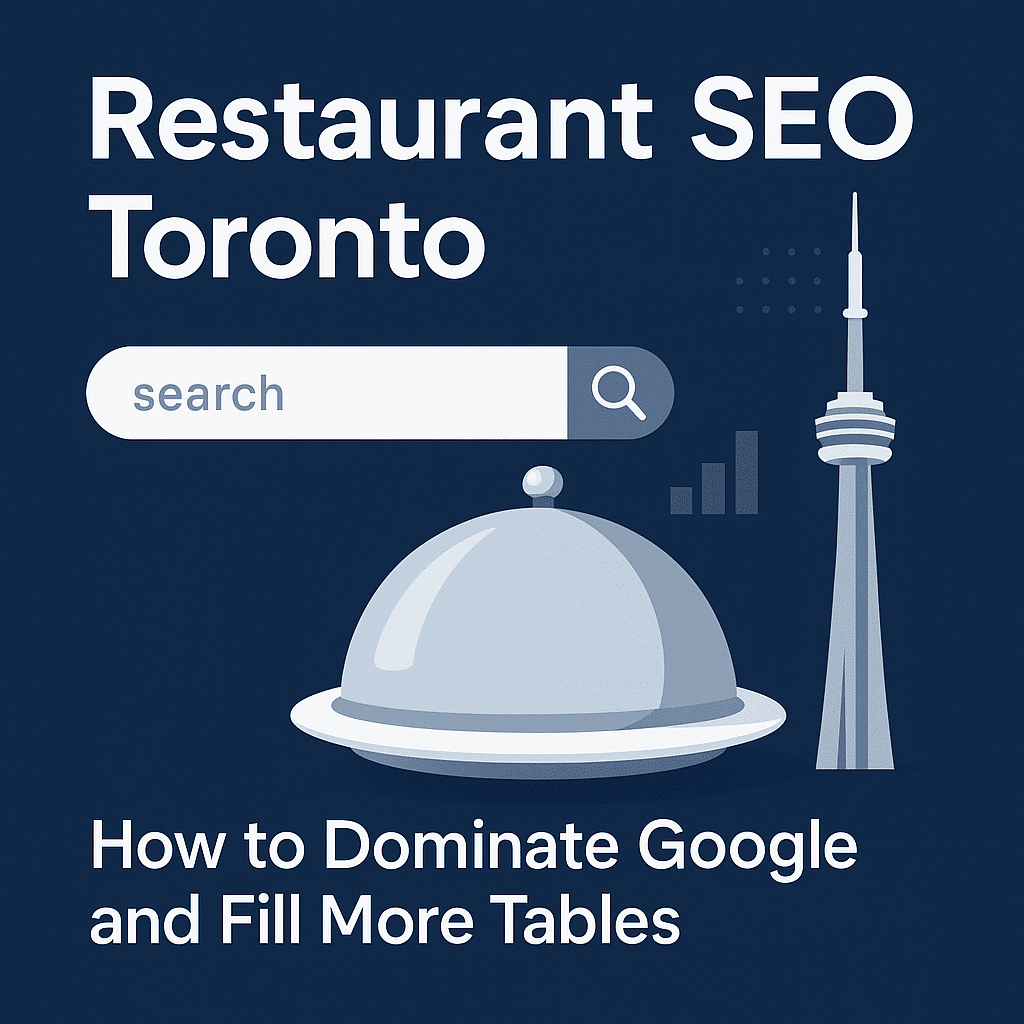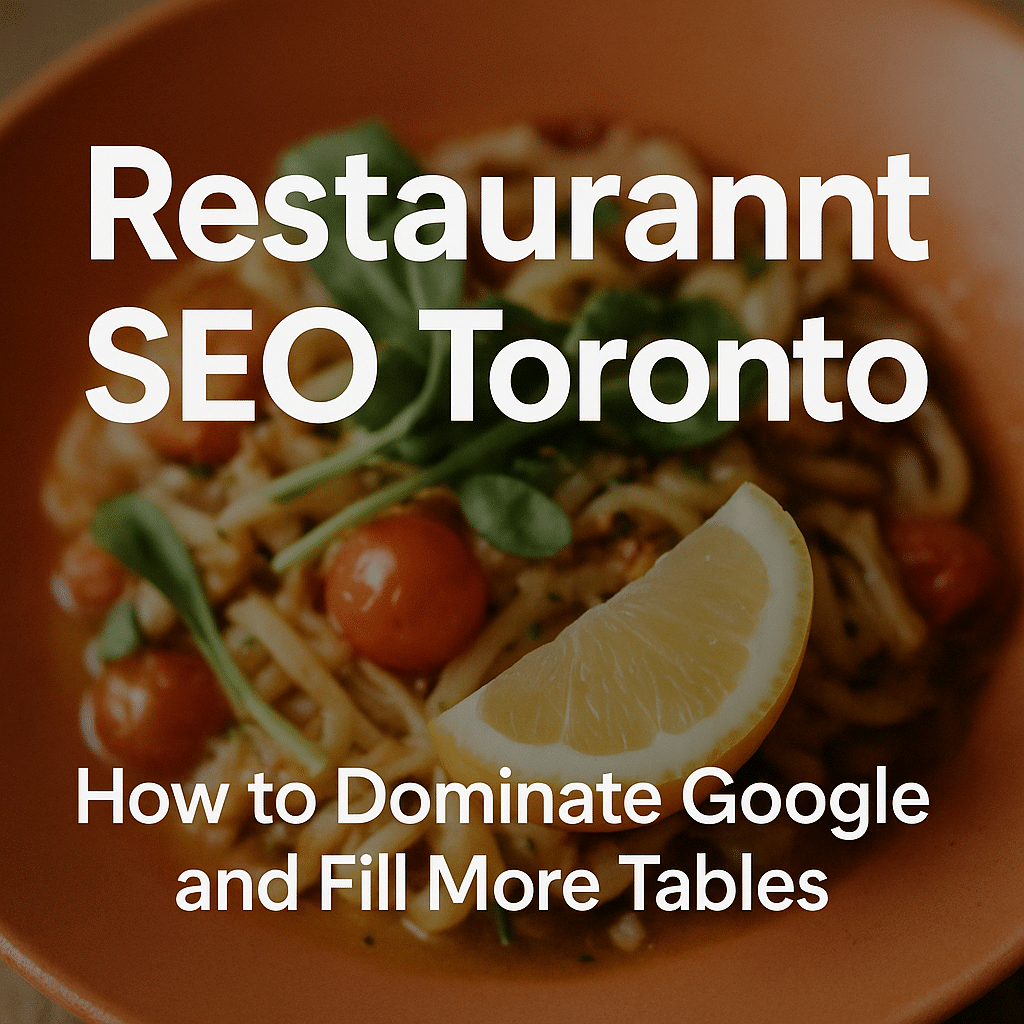How to Dominate Google and Fill More Tables

Why Restaurant SEO in Toronto Matters More Than Ever
Toronto’s food scene is exploding — from hidden ramen bars to upscale steakhouses, the competition is cutthroat. But here’s the truth: no matter how good your food is, if people can’t find you online, they’ll never taste it. That’s why Restaurant SEO in Toronto isn’t optional anymore — it’s essential.
Local search drives real foot traffic. When someone types “best Indian restaurant downtown Toronto” or “brunch near me,” your visibility on Google determines whether you win that customer or lose them to your competitor.
What Is Restaurant SEO?
Restaurant SEO (Search Engine Optimization) is the process of optimizing your restaurant’s website and online presence to show up higher in local search results. This means ranking for keywords like:
“Italian restaurant Toronto”
“Vegan brunch Toronto”
“Best dim sum downtown Toronto”
The goal? More visibility, more bookings, more revenue.
Keyword Research for Toronto Restaurant SEO
Before optimizing anything, you need to know what people are actually searching for.
Top keyword categories for Toronto restaurants include:
Cuisine type: “sushi Toronto,” “Lebanese food in Toronto”
Occasion-based: “romantic dinner Toronto,” “birthday restaurant Toronto”
Meal type: “Toronto brunch spots,” “best lunch downtown”
Location-based: “restaurant in Yorkville,” “Kensington Market food”
Use tools like SEMRush, Ahrefs, or even Google Keyword Planner to uncover these opportunities. Don’t ignore long-tail keywords — they convert better. For example, “best Korean BBQ near Yonge and Finch” may have lower search volume but brings highly motivated traffic.
Google Business Profile Optimization
One of the most powerful (and free) SEO tools for local restaurants is your Google Business Profile (formerly Google My Business).
Here’s how to fully optimize it:
Claim and verify your listing
Use your exact business name (no keyword stuffing)
Choose the most relevant categories (e.g. “Thai Restaurant”)
Add high-resolution photos of your food, dining space, and staff
Post regular updates — weekly specials, events, new menu items
Respond to reviews — especially negative ones, with professionalism
Use keywords naturally in your business description
A fully optimized profile helps you show up in the Google 3-Pack (top 3 local results), which is prime real estate.
On-Site SEO: What Your Restaurant Website Needs
Your website is more than just a digital menu — it’s a ranking machine if optimized correctly.
Must-have on-page SEO elements:
Keyword-rich headings: Use H1 for the page title and H2s for sections like “Our Menu,” “Reservations,” “About Us”
Meta titles and descriptions: Include your cuisine and location in the meta title, like “Best Mexican Restaurant in Toronto – [Restaurant Name]”
Alt text for images: Every dish photo should have descriptive alt tags
Page speed optimization: Use tools like WP Rocket or LiteSpeed Cache to make sure your site loads in under 3 seconds
Mobile responsiveness: Over 70% of diners browse from mobile
Schema markup: Use “Local Business” and “Restaurant” schema to help Google understand your site
Don’t forget to optimize your menu page — it’s one of the most visited, and Google crawls it too.
Content Marketing for Restaurant SEO
Google loves fresh, relevant content. This doesn’t mean cranking out blog posts just for the sake of it — think strategically.
Effective content ideas:
“Top 5 Dishes to Try in Toronto This Winter”
“Behind the Scenes at [Your Restaurant Name]”
“How We Source Local Ingredients in Toronto”
Seasonal menus, chef spotlights, or collaborations with local breweries or farms
Use these articles to target specific keywords and link internally to your menu and reservation pages. It boosts authority and dwell time.
Backlink Building: The Secret Sauce of SEO
Backlinks = votes of confidence from other websites. The more high-quality backlinks you have, the more Google trusts you.
Tactics that work for Toronto restaurants:
Get listed in local food directories like BlogTO, Narcity, and Yelp
Reach out to Toronto food bloggers for reviews or collabs
Offer to host media nights or influencer dinners
Sponsor local events or donate gift cards in exchange for a link
One quality link from a Toronto-based publication can move the needle more than 50 low-quality backlinks.
Social Media Signals + SEO
While social signals don’t directly affect rankings, they amplify your content, boost engagement, and drive branded searches — which Google loves.
Post your blogs on Instagram and Facebook Stories
Embed Google Maps directions in your Instagram bio link
Use location tags and hashtags like #TorontoFoodie, #TorontoEats
Track Your Restaurant SEO Performance
SEO isn’t a one-time job. You need to track, test, and tweak.
Metrics to monitor:
Google rankings (use tools like SERanking or SEMrush)
Google Business Profile Insights (calls, direction requests, bookings)
Organic traffic via Google Analytics
Click-through rates on your metadata
Bounce rate on key pages like “Reservations”
Set up Google Search Console to see exactly what queries are bringing people to your site — and where you’re missing out.
Toronto Restaurant SEO FAQs
How long does restaurant SEO take in Toronto?
Usually 3–6 months for noticeable traffic increases. Competitive keywords may take longer.
Should I hire a Toronto SEO expert?
If you don’t have time to consistently optimize your site, yes. A local expert knows how to rank in the GTA.
Is it worth blogging as a restaurant?
Yes — especially when targeting long-tail local keywords and events. It builds relevance and authority.
Conclusion: Feast on the First Page or Stay Invisible
In a city as competitive and culinary-driven as Toronto, your restaurant can’t afford to be invisible on Google. Restaurant SEO Toronto is the bridge between your incredible dishes and the customers who are actively searching for them.
Investing in local SEO is like hiring a 24/7 digital maître d’ — always welcoming, always working. Whether you’re a cozy bistro in the Annex or a high-end steakhouse in the Financial District, dominating local search means dominating dinner plans.


